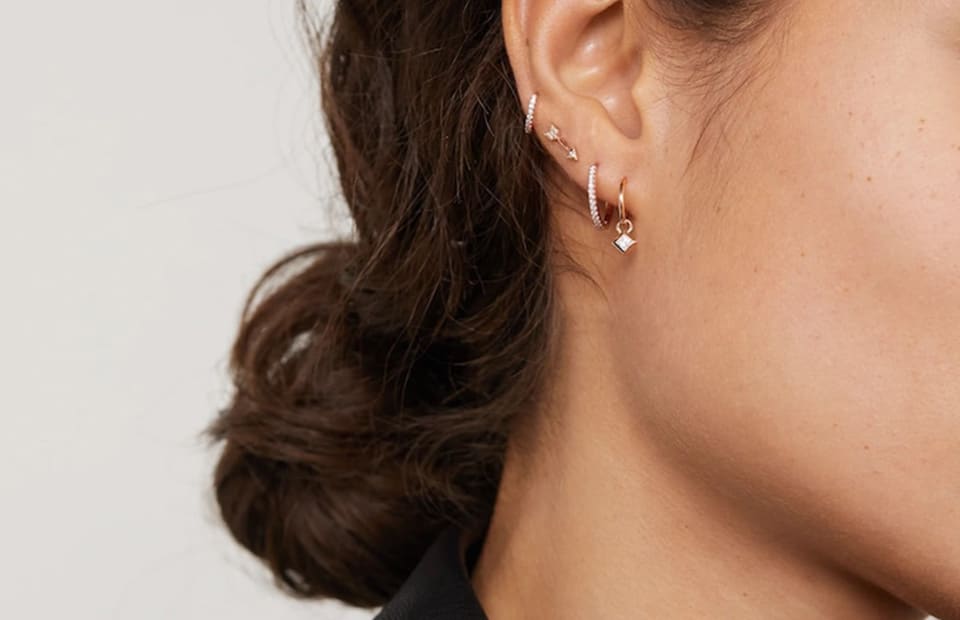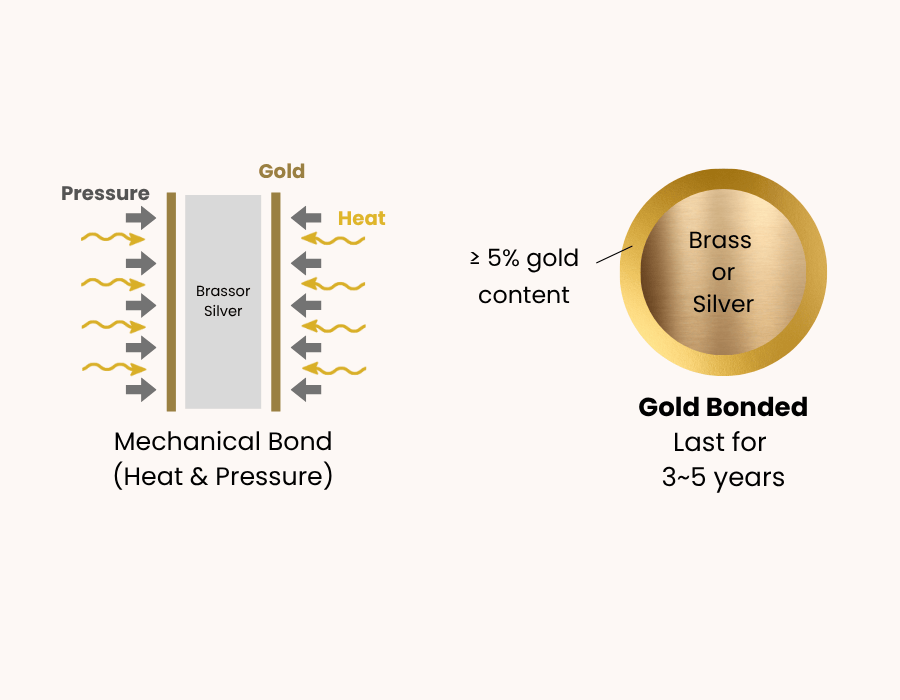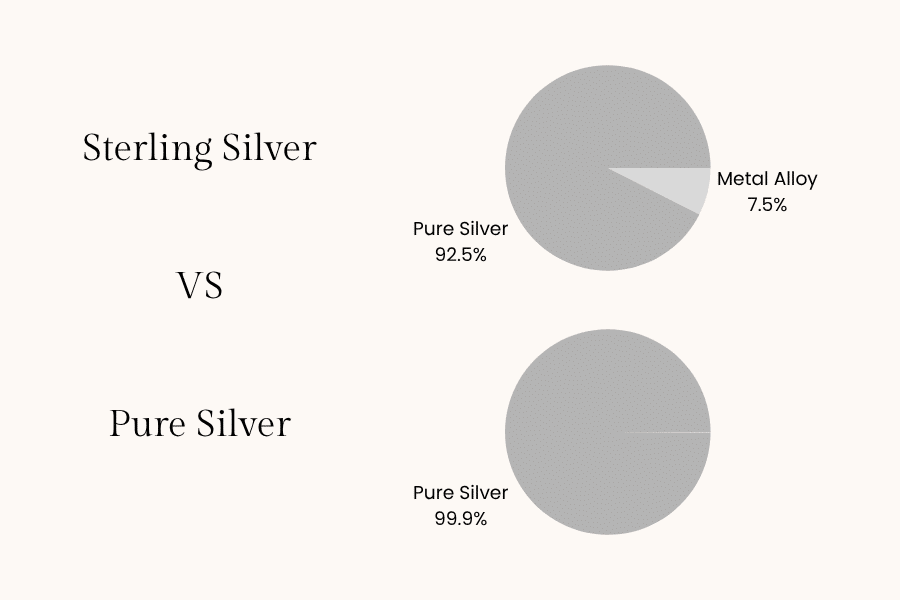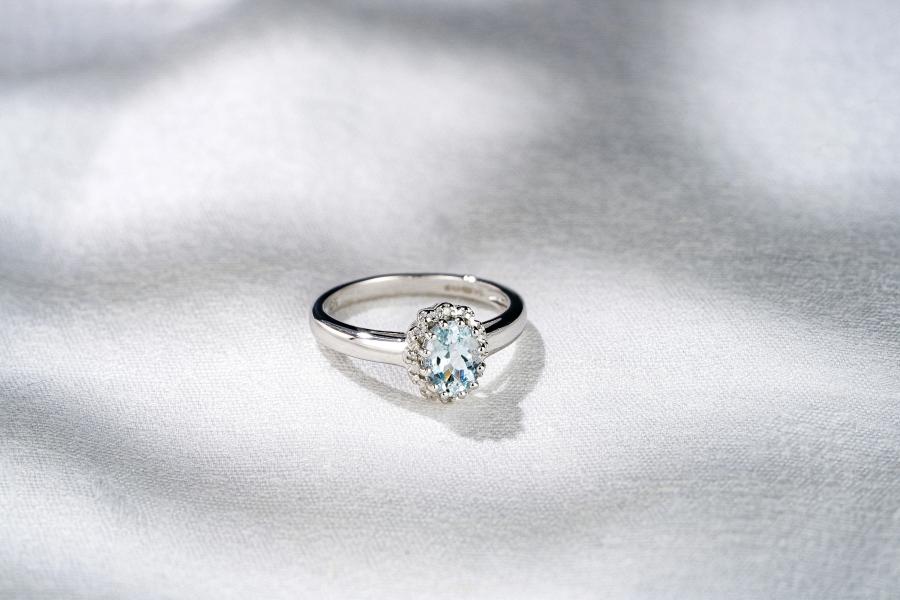If your ears feel itchy or your skin gets covered up in a blotchy, red tone after wearing jewelry, chances are that you are allergic to the jewelry metal. Oftentimes, the reaction could start from having symptoms of Contact Dermatitis, which could be very uncomfortable.
Allergies to earrings and other jewelry pieces are more frequent with people who have sensitive skin. Fortunately, with hypoallergenic jewelry, there is no need to compromise style because of your skin sensitivity. These pieces are available in timeless designs and trendy styles.
In this post, we will elaborate more on what hypoallergenic earrings are, the materials they are made of, as well as how to relieve allergic earlobes from earrings.
What are Hypoallergenic Earrings?
Hypoallergenic is a term that describes pieces of jewelry that are less likely to cause allergic reactions. Hypoallergenic earrings for sensitive ears always contain little to no potentially irritating metals.
It is essential that you know which metals you are sensitive to, and which are safe. Doing this will enable you to make an informed decision when buying allergy free earrings. Although everyone is sensitive to different metals, Nickel is the most common culprit for metal allergies, as explained in this nickel-free jewelry guide.
Hypoallergenic Earrings Materials
What are hypoallergenic earrings made of? Unlike traditional earrings that are often made with nickel, which can cause skin irritation or allergic reactions, hypoallergenic earrings are composed of precious metal materials like:
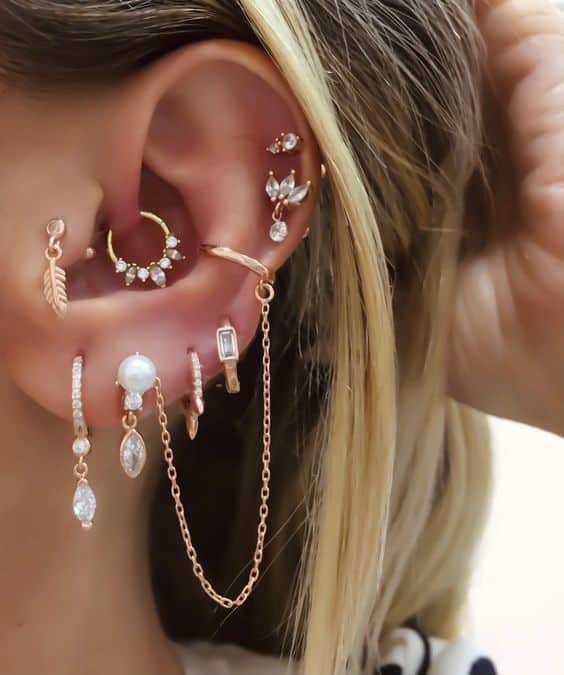
Gold
This is a reliable nickel free earrings material. However, pure gold, which is also referred to as 24 karat gold, is very soft and will lose its shape if made into jewelry. Hence, most gold jewelry pieces are combined with stronger metals, resulting in other purity levels like 10k, 14k, 18k, and 22k. When buying gold earrings for sensitive ears, make sure to find out what the stronger metals in the alloy are. Make sure you don’t choose one with irritating metal.
Sterling Silver
Just like gold, pure silver is too soft to make earrings. This results in the creation of sterling silver, which is an alloy that contains 92.5% pure silver and 7.5% of other metals. When the other metals include zinc or copper, the allergic reaction is very low and considered safe to wear for individuals with sensitive skin. Therefore, sterling silver and allergies are an unfamiliar pair unless the alloyed metals contain nickel.
Platinum & Rhodium
These precious metals belong to the same family and are part of the most valuable materials in the world. They hardly tarnish or corrode, hence why they are often used as plating over weaker metals. With platinum or rhodium, you can rest assured that you are investing in good earrings for sensitive ears.
Titanium & Niobium
The difference between these two fantastic hypoallergenic jewelry materials is that niobium has a smoother surface finish, it’s rarer, and more expensive. But both of them are lightweight, strong, and resistant to corrosion. Unlike other metals that require painting or plating, titanium and niobium are cured in an electric bath. This means they won’t tarnish and their color would never wear down.
Best Earrings for Sensitive Ears
When choosing earrings for sensitive ears, it is best to choose earring options that are gentle on the skin and do not cause irritation, such as:
Stud Earrings
These types of earrings are very ideal for people with sensitive ears because they don’t dangle or move around. These sensitive earlobes earrings are a top choice thanks to their minimal contact with the skin, reducing the risk of irritation.
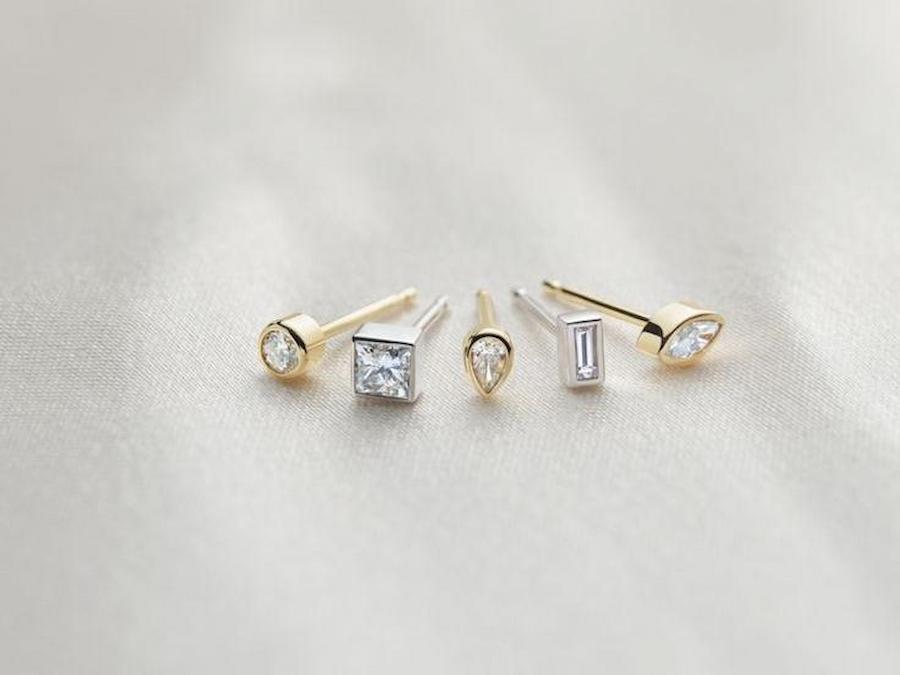
Hoop Earrings
Choose hoops that are lightweight and made from hypoallergenic metals like titanium or niobium. It’s best to select those with smooth edges and minimal protrusions. This reduces friction and risk of irritation when the hoop rubs against the earlobe.
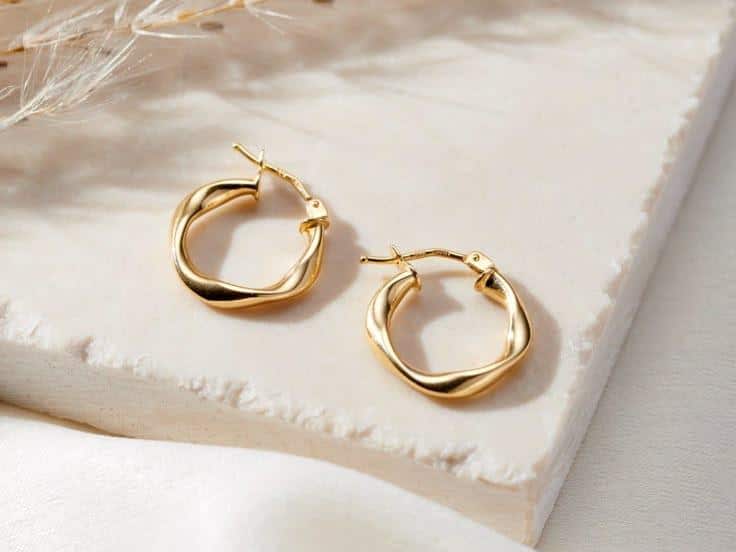
Cartilage Earrings
These types of earrings are worn in parts like the upper ear or helix. Choose a cartilage earring with a design that prioritizes comfort and security, as these areas are more sensitive.
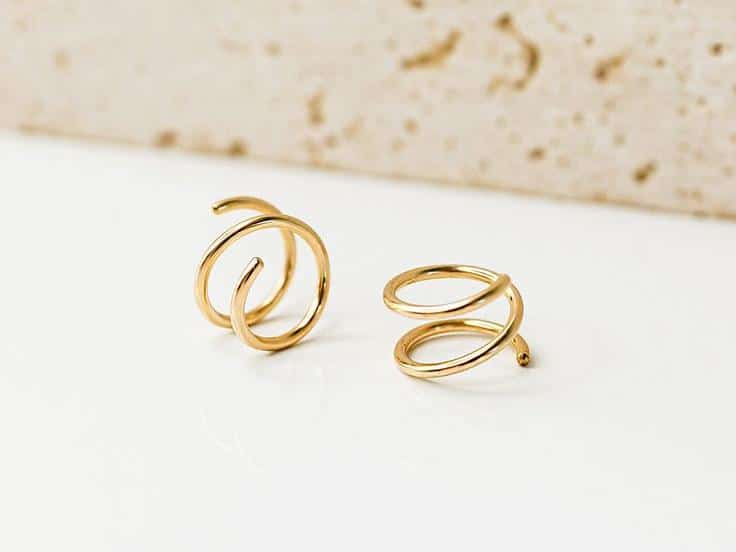
Best Hypoallergenic Earrings for Newly Pierced Ears
When choosing earrings for newly pierced ears, it’s essential to prioritize materials that are safe, non-irritating, and designed to promote healing:
- Surgical stainless steel is durable, corrosion-resistant, and widely recommended for sensitive skin. It’s a common material for starter earrings after piercing.
- Titanium is lightweight, nickel-free, and biocompatible, making it ideal for sensitive ears. Implant-grade titanium (G23) is particularly safe for long-term wear.
- Higher karat gold (14k or 18k) is less likely to cause allergic reactions compared to lower karat gold or gold-plated options. It’s the best metal for sensitive ear piercing.
- Platinum is a rare, hypoallergenic metal that is both durable and luxurious. It’s an excellent choice for those who want a high-end option.
Is Gold-plated Jewelry Hypoallergenic?
Gold-plated jewelry is not always hypoallergenic. Whether it’s safe for sensitive skin largely depends on the base metal used and the plating technique. If the base metal contains nickel or other reactive alloys, it can still trigger irritation especially if the gold layer is thin or wears off over time.
However, high-quality plating with a thicker gold layer, such as gold vermeil jewelry or gold filled jewelry can help minimize skin contact with the base metal, making it more skin-friendly. To ensure suitability, it’s best to check with the jeweler about both the plating thickness and the base material.
Is 18k Gold Hypoallergenic?
18k gold is generally considered to be hypoallergenic because it is purer than lower karat gold alloys like 10k and 14k. It stands in the middle, containing a higher percentage of pure gold (18 out of 24) and fewer alloying metals. However, in rare cases, some people still experience allergies to 18k gold.
Are Brass Earrings Hypoallergenic?
Brass earrings are not naturally hypoallergenic, as brass is an alloy made primarily of copper and zinc. However, with proper gold, silver or rhodium plating, brass earrings can be made more skin-friendly by creating a barrier that prevents direct contact with the metal. If you have metal sensitivities or newly pierced ears, it’s still recommended to choose high-quality, well-coated brass earrings or opt for fully hypoallergenic materials for maximum comfort and safety.
Is Sterling Silver Hypoallergenic for Earrings?
Sterling silver can be hypoallergenic for some people, but it depends on the individual’s sensitivity. Sterling silver is an alloy made of 92.5% silver and 7.5% other metals, often copper. While pure silver is hypoallergenic, the added metals (like copper) can sometimes cause reactions in people with very sensitive skin. Additionally, if the sterling silver contains traces of nickel, it may trigger allergies. For those with sensitive ears, it’s safer to choose nickel-free sterling silver or opt for metals like titanium, 14k/18k gold, or platinum, which are the best hypoallergenic earring metal.
Does Nickel-free mean Hypoallergenic?
Nickel-free doesn’t mean hypoallergenic. It’s imperative to note that some jewelry that are described as hypoallergenic contain some amount of nickel, however in very small quantities. This makes them less likely to cause reaction or irritation.
How to Relief Allergic Earlobes from Earrings?
According to the common saying “prevention is better than cure.” It’s best to avoid buying jewelry pieces that cause reactions. So, buying earrings, rings, and necklace hypoallergenic jewelry that are made from nickel-free metals is advisable.
Also, choose the right earring back, as this determines how comfortable the earrings are to wear. For sensitive ears, it’s advisable you choose earrings with hypoallergenic or silicone backs.
If you are in doubt as to the reliability of a particular earring, test it for sensitivity before buying. You can do this by placing the back of the earring against the back of your earlobe. Assess after a couple of hours to see if there are signs of earring allergy, such as redness, itching, swelling, or irritation. This simple test can help you avoid discomfort and ensure the earrings are safe for your skin.
Perhaps you’ve already purchased a piece that’s causing you to have an allergic reaction, follow these options:
- Only wear the jewelry for a short period.
- Try to keep your skin dry.
- Consult a professional jeweler and inquire if the piece can be plated or coated with a non-irritating metal.
- Apply a thin coat or clear nail polish to the part of the jewelry that makes contact with your skin.
Conclusion
There are various factors to consider when choosing sensitive earlobe earrings. The most important factor however, is to select pieces made from hypoallergenic materials like gold, sterling silver, platinum, rhodium, titanium, and niobium. Another essential factor is choosing good earrings for sensitive ears, such as studs, hoops, and cartilage earrings.
While there are several options on the market, it is better you do diligent research and buy from a reputable brand that sells quality products. This guarantee your safety from earrings that are made with weak and potentially irritating metals.
